Learning, Breathing, and the End of the World: TEDX Springfield
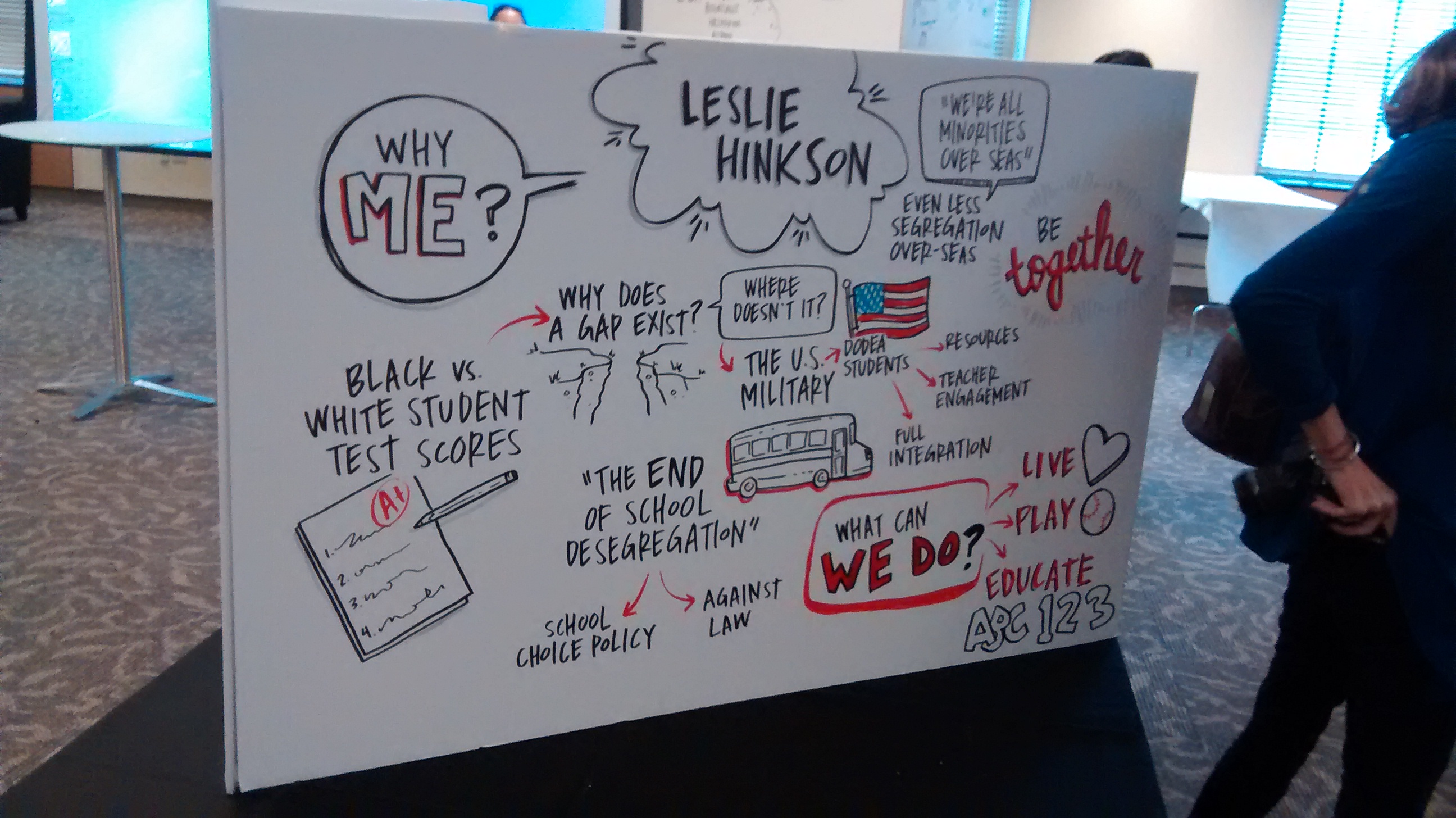
#TEDxSpringfield’s fourth annual event was held Friday, and as always, lots of brain stim.
I’ve already blogged on my personal favorite talk: Randy Pierce, a blind athlete who recently climbed Kilimanjaro, on how he perceives the world. But there were plenty of other highlights to share:
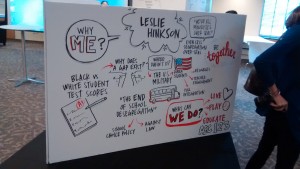 Leslie Hinkson: If we want real desegregation, we need to not only make sure black and white kids attend the same schools, but that they interact socially within the school.
Leslie Hinkson: If we want real desegregation, we need to not only make sure black and white kids attend the same schools, but that they interact socially within the school.
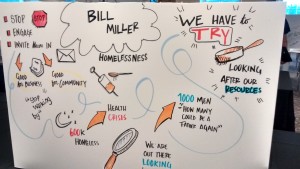 Bill Miller: To deal effectively with homelessness, first get people off the streets and into housing. THEN start addressing the other pieces, like jobs, addictions, etc. And this is good for the community, even the business community.
Bill Miller: To deal effectively with homelessness, first get people off the streets and into housing. THEN start addressing the other pieces, like jobs, addictions, etc. And this is good for the community, even the business community.
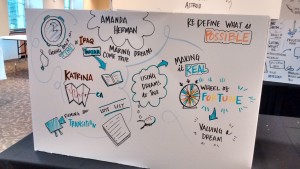 Amanda Herman: Making films “focusing on what people wish to happen, in their dreams. What is it to make someone else’s dreams come true? I gather with people to transform their ideas into public arts projects…The outcome of each project is joy…What’s possible and impossible in the world is largely a social construct. It’s up to us to redefine what is possible…and make it happen.
Amanda Herman: Making films “focusing on what people wish to happen, in their dreams. What is it to make someone else’s dreams come true? I gather with people to transform their ideas into public arts projects…The outcome of each project is joy…What’s possible and impossible in the world is largely a social construct. It’s up to us to redefine what is possible…and make it happen.
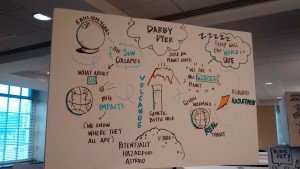 Darby Dyer: Despite 100,000 objects between the sun and Jupiter, our risk of being hit by the kind of cataclysmic asteroid that may have wiped out the dinosaurs. And the sun will keep producing energy and light for the next 5 million years or more. We are the “Goldylocks planet,” with perfect conditions to support human life. But even if we don’t have to worry about the planet surviving, we do have to worry about human survival. Catastrophic climate change is real, it’s here, and our window for addressing it is shrinking.
Darby Dyer: Despite 100,000 objects between the sun and Jupiter, our risk of being hit by the kind of cataclysmic asteroid that may have wiped out the dinosaurs. And the sun will keep producing energy and light for the next 5 million years or more. We are the “Goldylocks planet,” with perfect conditions to support human life. But even if we don’t have to worry about the planet surviving, we do have to worry about human survival. Catastrophic climate change is real, it’s here, and our window for addressing it is shrinking.
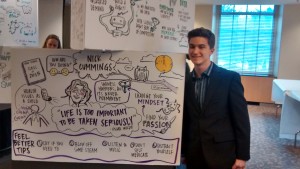 Nick Cummings: A recent high school graduate who has faced disability-level breathing problems since birth, he shared insights on being social when you don’t fit in, and on overcoming the depression of being different: “DON’T think the answer is in a pill or a bottle, unless that pill is made of chocolate and the bottle is Mr. Bubble bubble bath…Find the positive in every situation. Take all that raw emotion and have it drive you to be better…We’re all gloomy depressive messes some time. But there must have been something so fantastic before that to make you feel that way. A roller coaster doesn’t only go up.
Nick Cummings: A recent high school graduate who has faced disability-level breathing problems since birth, he shared insights on being social when you don’t fit in, and on overcoming the depression of being different: “DON’T think the answer is in a pill or a bottle, unless that pill is made of chocolate and the bottle is Mr. Bubble bubble bath…Find the positive in every situation. Take all that raw emotion and have it drive you to be better…We’re all gloomy depressive messes some time. But there must have been something so fantastic before that to make you feel that way. A roller coaster doesn’t only go up.
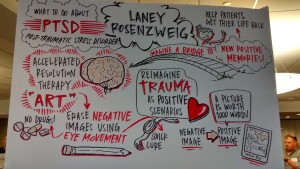 Laney Rosenzweig: If we can replace the images we have of traumatic events (often with metaphors), we can reduce the post-traumatic stress. Our memories are not fixed, but fluid, and we can create memories of traumatic events that we can live with, that don’t trap or paralyze us.
Laney Rosenzweig: If we can replace the images we have of traumatic events (often with metaphors), we can reduce the post-traumatic stress. Our memories are not fixed, but fluid, and we can create memories of traumatic events that we can live with, that don’t trap or paralyze us.
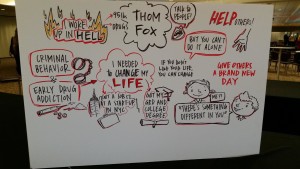 Thom Fox: As a former drug abuser and gang member, “I’d been on my way to being dead…Life doesn’t have to be miserable. If you don’t like your life, change it. I understood that I could reach out and they’d be kind enough to help. No one succeeds alone. Once you get through hell, you can help one person, two people. That could be exponential and change the world. The more opportunity you create for others, the more you create for yourself.
Thom Fox: As a former drug abuser and gang member, “I’d been on my way to being dead…Life doesn’t have to be miserable. If you don’t like your life, change it. I understood that I could reach out and they’d be kind enough to help. No one succeeds alone. Once you get through hell, you can help one person, two people. That could be exponential and change the world. The more opportunity you create for others, the more you create for yourself.
“The one commonality for all the bad things that happened to me—was me. That’s what I had to overcome.
“Tofu takes on the flavor of whatever it’s with. People are like tofu. Surround yourself with potential, and it will be fulfilled… One person changed my life. I’m passing that on exponentially. What if your conversation was that one thing that changed their life?”
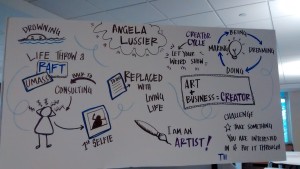 Angela Lussier: “When I graduated, I thought I had to abandon the artist in order to become a business person. What I realized is I can be an artist and a business person. Even stuffed celery could be an art project…I did a video, with sliding down slides and swinging on swings. I thought, is this something business people do? But the response was, ‘we had so much fun watching you have fun as you taught business principles.’
Angela Lussier: “When I graduated, I thought I had to abandon the artist in order to become a business person. What I realized is I can be an artist and a business person. Even stuffed celery could be an art project…I did a video, with sliding down slides and swinging on swings. I thought, is this something business people do? But the response was, ‘we had so much fun watching you have fun as you taught business principles.’
“The difference is my mindset. I was really outcome-focused at the beginning. Today, I have a creator’s mindset, more focused on learning and growing—the journey. The creator’s cycle: Being–>Dreaming–>Doing–>Making–>Being (reflect on what happened/worked: what happened, what didn’t, what am I scared of). The moment we want to quit lies right before the doing stage. When you move from ‘this won’t work’ to ‘let me just try this,’ a lot of things happen.
“When I figured out that I’m a weird person, I found out everyone else is too; we’re all just pretending to be normal.”
Several other speakers were also on the program, and they had good insights as well—but the notes I took on their sessions don’t lend themselves to reportage. Here are their storyboards (all prepared in real time by the graphics agency Collective Next).


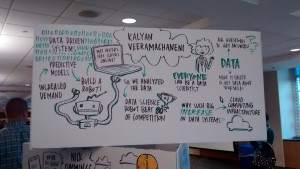
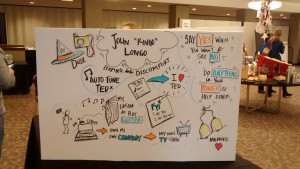
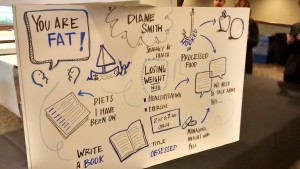
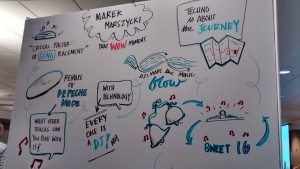
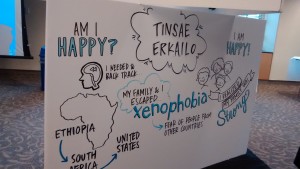

0 Comments on “Learning, Breathing, and the End of the World: TEDX Springfield”